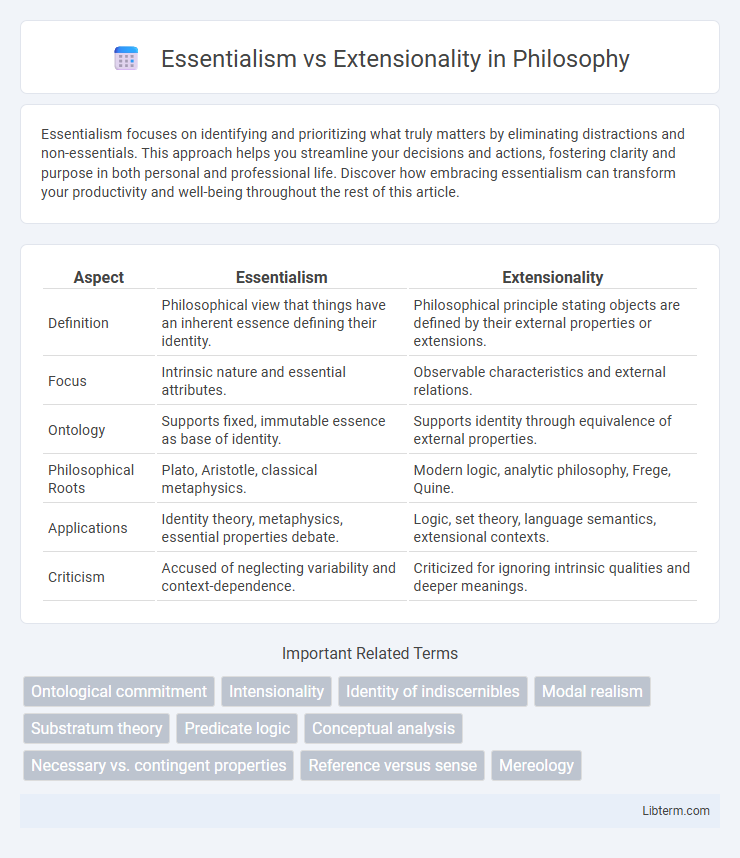Essentialism focuses on identifying and prioritizing what truly matters by eliminating distractions and non-essentials. This approach helps you streamline your decisions and actions, fostering clarity and purpose in both personal and professional life. Discover how embracing essentialism can transform your productivity and well-being throughout the rest of this article.
Table of Comparison
| Aspect | Essentialism | Extensionality |
|---|---|---|
| Definition | Philosophical view that things have an inherent essence defining their identity. | Philosophical principle stating objects are defined by their external properties or extensions. |
| Focus | Intrinsic nature and essential attributes. | Observable characteristics and external relations. |
| Ontology | Supports fixed, immutable essence as base of identity. | Supports identity through equivalence of external properties. |
| Philosophical Roots | Plato, Aristotle, classical metaphysics. | Modern logic, analytic philosophy, Frege, Quine. |
| Applications | Identity theory, metaphysics, essential properties debate. | Logic, set theory, language semantics, extensional contexts. |
| Criticism | Accused of neglecting variability and context-dependence. | Criticized for ignoring intrinsic qualities and deeper meanings. |
Introduction to Essentialism and Extensionality
Essentialism posits that objects possess inherent, defining properties that determine their identity, emphasizing intrinsic characteristics as fundamental to classification. Extensionality, in contrast, defines objects by their external relations and observable extensions, focusing on equivalence through membership or referential criteria. Understanding these contrasting approaches reveals their impact on ontology, logic, and linguistic semantics, especially in defining the essence versus the extension of concepts or entities.
Historical Background and Philosophical Roots
Essentialism traces back to Aristotle's metaphysics, emphasizing that objects possess intrinsic properties defining their identity and essence. Extensionality emerged prominently in 20th-century analytic philosophy and logic, particularly through Frege and Russell, focusing on objects' relations defined by their external references or extensions rather than inherent qualities. The philosophical roots of essentialism lie in Platonic idealism and Aristotelian substance theory, while extensionality is grounded in formal logic and language analysis, marking a shift from metaphysical to linguistic criteria for identity and meaning.
Defining Essentialism: Core Principles
Essentialism asserts that objects and entities possess inherent, immutable properties that define their true nature and identity across all possible contexts. Core principles emphasize the necessity of these essential characteristics as the basis for determining what an object fundamentally is, distinguishing it from accidental or contingent traits. This philosophical stance underpins debates in metaphysics regarding identity persistence, classification, and the nature of existence itself.
Understanding Extensionality: Key Concepts
Extensionality in logic and mathematics asserts that two sets or functions are identical if they have the same elements or output values, emphasizing observable properties rather than internal characteristics. This principle is fundamental in set theory and functional programming, where the identity of an entity depends solely on its extension rather than its definition or construction. Understanding extensionality aids in distinguishing objects by their external behavior, facilitating clear equivalence criteria in formal reasoning and computational contexts.
Essentialism vs Extensionality: Major Differences
Essentialism emphasizes that entities have a set of core, necessary properties defining their identity, while extensionality asserts that objects are identical if they share the same external properties or extensions. In philosophy and logic, essentialism focuses on intrinsic qualities that cannot change without altering an entity's essence, whereas extensionality prioritizes observable traits or membership in sets as criteria for equality. This foundational difference influences debates on identity, classification, and the nature of properties in metaphysics and semantics.
Applications in Philosophy and Logic
Essentialism in philosophy asserts that entities have inherent, defining properties that determine their identity, influencing debates on metaphysics and identity theory. Extensionality, fundamental in logic and set theory, posits that objects or sets are identical if they share the same external properties or elements, shaping formal systems and semantic theories. Both concepts critically impact modal logic, ontology, and the analysis of language, providing frameworks for understanding necessity, equivalence, and classification in philosophical logic.
Implications for Metaphysics and Ontology
Essentialism posits that objects possess intrinsic properties defining their identity, fundamentally shaping metaphysical debates about the nature of existence and persistence. Extensionality, emphasizing objects' identity based solely on their members or parts, influences ontological discussions by challenging the necessity of intrinsic qualities for object individuation. These contrasting views impact the interpretation of identity conditions, modality, and the metaphysical grounding of entities within ontology.
Criticisms and Debates in Contemporary Thought
Criticisms of essentialism highlight its tendency to oversimplify identity by ignoring social and contextual variability, which contemporary philosophers argue leads to exclusionary or deterministic perspectives. Debates on extensionality focus on the principle that entities are identical if they share the same external properties, yet critics contend this overlooks intrinsic qualities and the nuances of meaning in natural language. These ongoing discussions challenge rigid categorizations and push for more dynamic, context-sensitive frameworks in metaphysics and philosophy of language.
Case Studies: Real-World Examples
Case studies in philosophy and computer science illustrate essentialism by identifying the inherent properties defining an entity's identity, such as the molecular structure defining water's essence. In contrast, extensionality is reflected in database management systems where sets are equivalent if they contain the same elements, regardless of their defining attributes. Real-world applications in artificial intelligence and ontology design leverage these principles to optimize reasoning and classification algorithms.
Conclusion: Future Directions in the Discourse
Emerging research in essentialism versus extensionality emphasizes refining semantic frameworks to better capture context-dependent meaning nuances. Future discourse is likely to integrate cross-linguistic data and cognitive semantics, enhancing the understanding of how essential properties influence language interpretation. Advanced computational models are expected to play a crucial role in resolving ambiguities between essential and extensional references in natural language processing.
Essentialism Infographic

 libterm.com
libterm.com